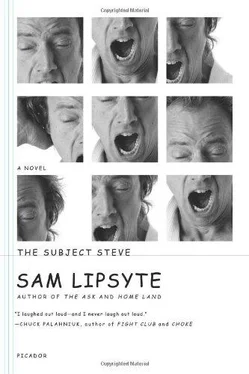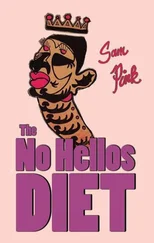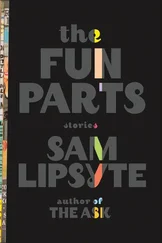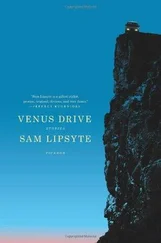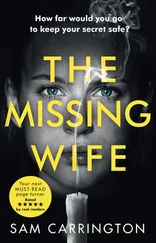"Is there a bus?" I asked Steve.
"Of course there's a bus," he said.
Fiona put fifty-three dollars' worth of motor oil she would never need on her mother's credit card. Steve counted out the cash.
"If you'd been more knowledgeable about Jap atrocities," he said, "I just might have given you the dough for the ticket straight up. But you see my predicament."
The bus didn't leave for a few hours. I hitched a ride with Donald to the hospital.
"I'm going that way, anyway," he said. "You might want to get some stitches or something. Or a body cast."
"I like your T-shirt," I said.
"It's meant to be provocative," he said. "I'm not really such a bad guy. I'm just stifled."
Local needlepoint adorned the walls of the Pangburn Falls Medical Clinic like cheery exhortations to liver failure. Everything stank of Lysol and meaningless neighborly death. An enormous woman in stretch pants approached me with a wooden clipboard and a pencil with a fluffy feather on it.
"Name, insurance company, complaint," she said.
Then she looked up from her clipboard.
"Oh my fucking word," she said.
The needlepoint sampler on the far wall read "God's on Duty." I studied it for days, maybe more than days, that pale stitchwork, those fleeces of cloudbank at the corners. When I felt up to moving my eyes a bit I commenced analysis of the fiberboard panels in the ceiling-like snowflakes, no two chemical flecks were alike-and the tulips going to dead rot on the windowsill.
My head was halo'd, stilled with welds. The rest of me was set in traction, some kind of high-tech mold.
A woman walked into my room, laid her hand on my mold.
"A man's home is his cast," she said.
I said nothing.
"Don't say anything," said the woman. "My name is Dr. Cornwallis. You've been severely injured. You're lucky the shock got you here. Now did you understand that the first thing I said to you was a pun? Do you like puns?"
My eyes went tulipward.
"Don't shake your head," said Dr. Cornwallis. "Nobody really likes puns. Even the good ones grate. There's a theory that chronic punning is a neurological disorder. Blink if you find that hypothesis remotely intriguing. Blink if you wish me to speak in less mannered style."
I was mute for another month.
Then I said something, a word.
The night nurse said the word was Steve. She said this the next night. Steve was her dead son's name, and she wanted to know if he'd given me any kind of message to deliver before Jesus released me on my own recognizance, as he sometimes did, when someone dies but still has a job to do, like deliver a message.
"Steve said to say he loves you," I said.
"That's it?"
"He's sorry he didn't listen to you more. About drugs and stuff. You know, how you shouldn't do them until you fall in love."
I felt suddenly groggy.
"I feel suddenly groggy," I said.
"How did he look?" said the night nurse.
"Who?" I said.
"My boy."
"The light was too bright. All I saw was this bright light."
I noticed now I was out of the mold, could use my hands. I used them to shape the idea of light.
"How did he sound?" said the night nurse.
"Like heavenly-like."
"What else?"
"Wings," I said.
"Wings?"
"Wings," I said.
The night nurse wiped my halo with a fold of gauze.
"Golly," she said. "Your holes look infected."
She pushed the gauze through a flap in the wall.
"What do you mean?" I said.
She stood, rolled my tray away.
"What if I need to reach my tray?" I said.
"What if?" said the night nurse. She used her hands to make the shape of if, or maybe it was what.
I waited for the day nurse.
Dr. Cornwallis poked her head into my room.
"I'm just poking my head in," she said.
"Okay," I said.
"How are you feeling?"
"Not so hot," I said.
"I wouldn't think so," said Dr. Cornwallis. "I'd be hard pressed to believe you if you told me you were feeling hot. That's what I told Sally. I told Sally you've been traumatized, and as a result you've experienced severe trauma. I'm talking about the wings incident. May I extend an apology on your behalf?"
"Extend," I said.
"Excellent," said Dr. Cornwallis. "Is there anything else I can do for you?"
"My tray."
"I'll get someone to come push it closer," said Dr. Cornwallis.
"Can't you do it?"
"I wish I could."
"Maybe God could do it," I said. "He's on duty."
"That's a joke, right?" said Dr. Cornwallis.
"Yes," I said.
"No, I just wanted to make sure it wasn't a pun."
The day nurse was Donald, the stifled guy from the gas station. He walked in, winked, rolled my tray back to my bed. He had his hair up in pigtails, a pentagram pinned to his scrubs.
"Don't worry about the dead kid thing," said Donald. "Sally's all hung up on her dead kid."
"How'd he die?" I said.
"Kid-type thing. Chased a ball into the street. Me, I have children, they aren't getting any balls, that's for sure. No balls, no horseshoes, none of that shit."
"Do you remember me?" I said.
"Sure. From the Shell. You looked even worse then."
"How do I look now?"
"Like you chased a ball into the street."
"Can I see? Can you bring me a mirror?"
"I'd advise against it," said Donald. "Maybe down the road."
I pointed up at the pentagram.
"Satan?" I said.
"Donald," said Donald.
Dr. Cornwallis poked her head into my room.
"Just thought I'd poke my head in," she said.
"Poke away," I said.
"We need to talk."
"Let's talk," I said.
"It's about your finances, or lack thereof. Your coverage has expired."
"I've reached the maximum amount of maximum expenditure."
"That's what I've been given to understand by Ms. Kincaid."
"My old pen pal."
"You're going to have to leave, I'm afraid."
"You can't do that," I said.
"We do it all the time."
"What about your hypocritical oath?"
"Now that's a pun."
"Sorry," I said.
"I've fulfilled my oath. I've treated you for your injuries. I can't help it if you have a preexisting condition."
"Preexisting?" I said.
The doctor pulled a shiny book from her doctor pocket.
PREXIS: THE RACE AGAINST PERSONAL EXTINCTION
by Leon Goldfarb, M.D., and Vaughn Blackstone, D.D.S.
"Blackstone's a dentist?" I said.
"I know the cover looks a little gaudy," said Dr. Cornwallis, "but it's quite a good book. It was given to me by a man who works at the alternative healing outreach program here at the hospital. We're trying to widen the scope of our treatment. Maybe there's a place for you there. Wen said there might be a place for you there."
"Wen?"
"Wendell Tarr is his name."
"The Wanderer Wendell," I said.
"Oh, he pretty much stays around here. Anyway, the alternative program is really your only alternative, given your lack of coverage. We make exceptions in the alternative program with regard to coverage, whereas in the traditional-"
"Okay," I said.
"Wonderful," said Dr. Cornwallis. "Now get out of bed. Let's see if you can walk."
I could walk. Waddle, rather. I could bend a bit, swivel, squat. It hurt. Not like it hurt in the hut, but it hurt. I figured I'd shake out the pain for a minute, make a dash for it, the door.
I made a dash for the door. Dr. Cornwallis had to call Donald in from the hall. He picked me up, toweled me off where I'd pissed my gown.
"Thanks," I said.
"It's what I do," said Donald.
The next morning I had a visitor. He stood near the window for a while, sniffed the dead flowers, glanced up, glided over. There was something of the sea in him. A man who swam with dolphins, maybe, manatees. I could see us underwater near a reef. We weren't talking. We were squeaking. We were genius mammals of the sea. Then the gentleman started talking.
Читать дальше
